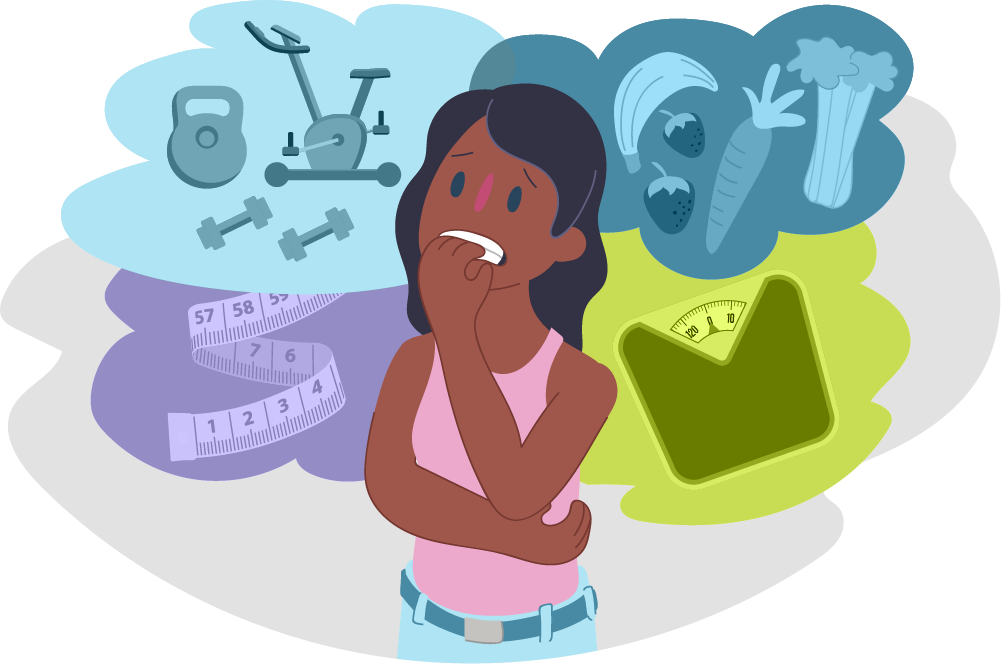
An Introduction:
Eating disorders are misinterpreted to be a choice people make about their food habits. However, in reality, eating disorders strongly correlate with mental health issues, and many people are not aware of it. The discussion revolving around mental health and disorders like such are taboo in our society. Eating disorders generally eventuate from an unhealthy obsession over one’s food, body image, and/or shape or weight. However, eating disorders also emerge from and are associated with mental illnesses such as anxiety disorders and depression. People suffering from eating disorders struggle with maintaining their daily diet, consequently falling sick or even threatening their lives. Regardless of the severity of the symptoms, if you suspect that you or your close ones have developed any symptoms of an eating disorder, you must immediately seek help or counseling. Early diagnosis has better chances of properly recovering an ailing individual.
Types of Eating Disorders:
(1) Anorexia Nervosa:
Anorexia Nervosa has the highest mortality rate among other eating disorders. It is mainly distinguished by self-starvation or abstaining oneself from proper food. Most people suffering from Anorexia Nervosa have a distorted sense of ideal body shape/size and go to extreme lengths to achieve that goal. People suffering from this disorder consider themselves overweight, go on constant diets, use laxatives, and over-exercise in hopes of reducing their weight.
A few symptoms of Anorexia Nervosa include; an intense fear of gaining weight, an extremely restricted diet, denial of the severity of the illness. This results in malnutrition, low blood pressure, and other such heart and brain problems.
Anorexia Nervosa has also led to depression in many cases. Due to a lack of proper food intake, people might experience negative mood changes and
negative emotions taking over. Depression and Anorexia Nervosa may also occur simultaneously, following a traumatic event. In such cases, people lose interest to do anything and undergo fatigue, causing them to skip meals as a result.
Anorexia Nervosa, like all other eating disorders, may also follow up from chronic anxiety. Being anxious about daily life events and wanting everything to be perfect causes people to lose appetite and skip meals.
(2) Bulimia Nervosa:
Bulimia Nervosa is another eating disorder where people consume an excessive amount of food without any control over the action and eventually compensate for the excess intake by trying to get rid of it forcibly, by vomiting, or using laxatives. Few symptoms include; inflamed throat, swollen glands, and dehydration from excessive release of fluids, resulting from vomiting. These may result in serious malnutrition problems.
Bulimia Nervosa may emerge from continuous substance and alcohol abuse, which psychologically exhausts an individual, causing them to lose control over their food consumption. Additionally, anxiety disorders may also cause Bulimia Nervosa. It is necessary for people suffering from these symptoms to seek help from a professional for quick recovery before it becomes majorly detrimental to one’s health.
(3) Binge-eating Disorder:
Binge-eating disorder is common in people who are obese or overweight. It occurs when people lose complete control over their food consumption and unlike Bulimia Nervosa, are not followed by compensation actions such as; vomiting or use of laxatives.
A few symptoms include; intake of excess food, even when one is not hungry, eating fast, eating in secret to avoid embarrassment.
Binge-eating disorder may emerge from anxiety disorders and as well as depression. Stress and agitation cause people to binge/stress-eat and worsen when they lose control over it.
Treatment:
Symptoms of these disorders should never be neglected and if any symptoms are suspected, immediate help must be sought. People with eating disorders are very likely to have other mental disorders such as depression and anxiety, and might even be suicidal. Therefore, diagnosing such illnesses early helps with quick recovery.
Treatment can be taken from professional counselors by psychotherapy, along with careful medical care and monitoring.
Writer- Zuaira Tasnim Hossain
